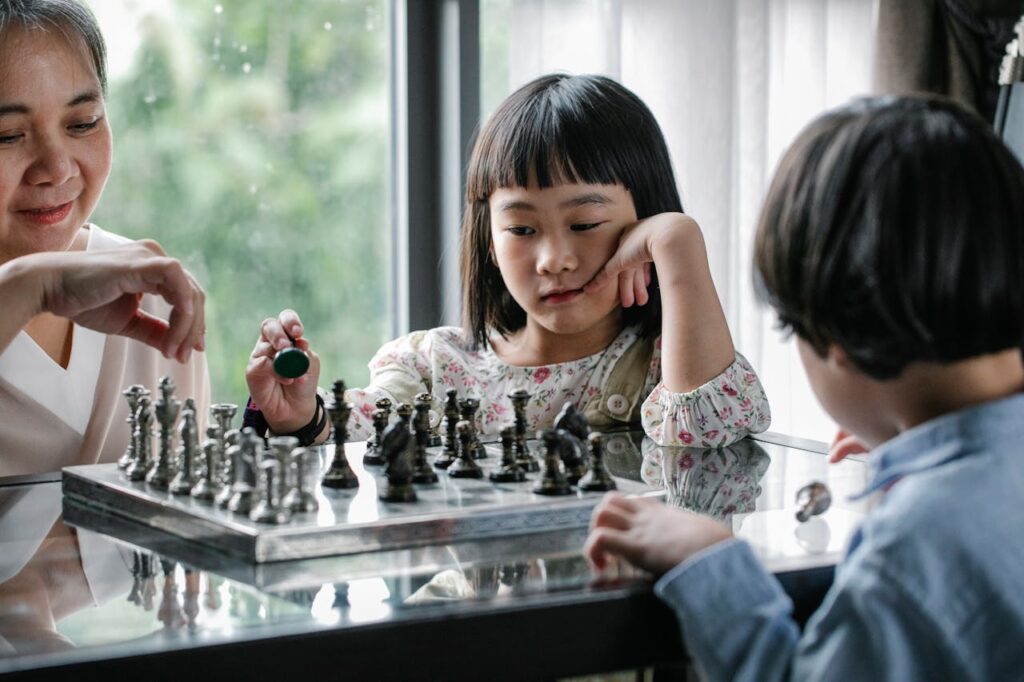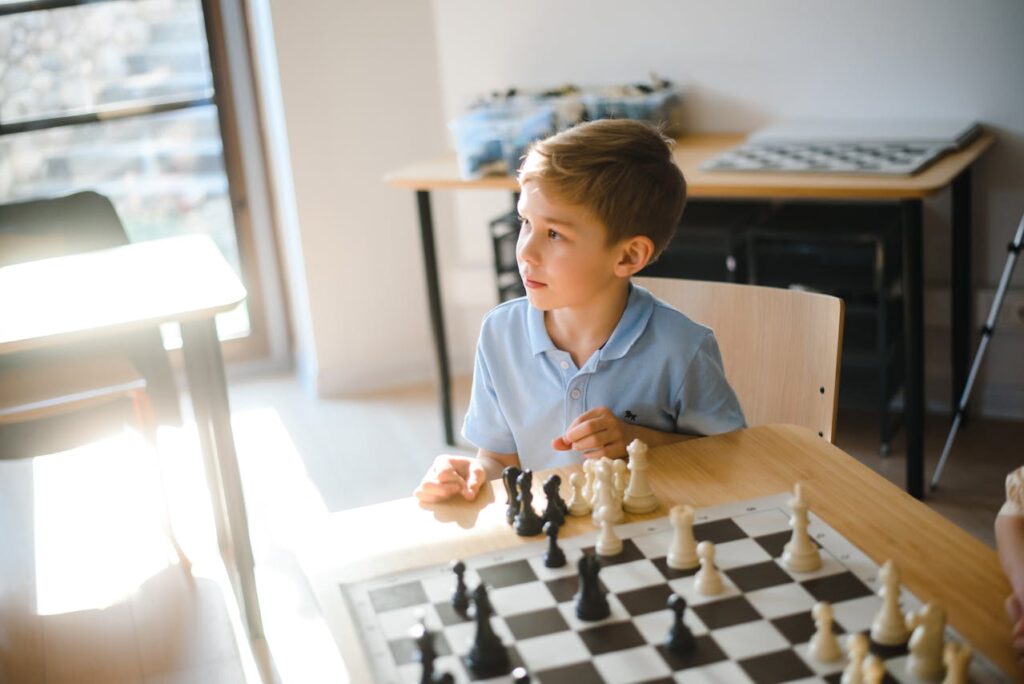Every parent wants to see their child grow up with a strong sense of self-confidence. Confidence is more than just feeling good about yourself; it’s about believing in your ability to face challenges, solve problems, and achieve goals.
While there are many ways to help children build confidence, one often overlooked tool is the game of chess. Chess, with its strategic depth and mental challenges, can be a powerful confidence booster for kids. It teaches them to trust in their decisions, learn from their mistakes, and take pride in their accomplishments.
The Power of Mastery: Building Confidence Through Skill Development
One of the most significant ways chess boosts a child’s confidence is through the development of skills and mastery over time. Chess is a game that rewards dedication and practice.
As children learn the rules, understand different strategies, and gradually improve their play, they gain a sense of accomplishment that directly feeds into their self-confidence.
Learning the Basics: The First Steps Toward Confidence
When a child first starts learning chess, they begin with the basics—how the pieces move, what the objective is, and the fundamental rules of the game.
At this stage, every new piece of knowledge is a small victory.
Understanding how the knight moves in an “L” shape or learning to avoid putting the king in check are all milestones that help build a child’s confidence.
These early lessons are crucial because they lay the foundation for more complex strategies and moves later on.
Each time a child successfully grasps a new concept, their belief in their ability to learn and succeed grows. This is particularly important for children who might struggle in other areas.
Chess provides a level playing field where their success is directly tied to their effort and understanding, which can be incredibly empowering.
Progressing Through the Ranks: Confidence in Growth
As children continue to play chess, they begin to develop more advanced skills.
They start to recognize patterns, understand common strategies like openings and endgames, and even anticipate their opponent’s moves.
This progression from a beginner to a more skilled player is a significant confidence booster.

Each new skill learned and each new strategy mastered reinforces the idea that effort leads to improvement.
This growth mindset—believing that abilities can be developed through dedication and hard work—is a key component of self-confidence.
When children see their skills improve as a result of their own efforts, they begin to believe in their ability to overcome challenges and succeed in other areas of life as well.
Achieving Small Victories: The Building Blocks of Confidence
In chess, every game is an opportunity to achieve a small victory.
Whether it’s successfully trapping an opponent’s piece, winning a pawn, or executing a planned strategy, these small wins are incredibly satisfying.
Each victory, no matter how small, contributes to a child’s growing sense of competence and confidence.
For a child, winning a chess game or even just making a particularly good move can be a source of pride. These achievements are tangible evidence of their skills and intelligence.
Even in games where they don’t win, children can find satisfaction in recognizing how much they’ve improved or in successfully applying a new strategy they’ve learned.
Overcoming Challenges: Confidence Through Resilience
Chess is not just about winning—it’s about learning to face and overcome challenges. Every game of chess presents a series of problems that need to be solved.
Sometimes, these problems are straightforward, and other times they require deep thinking and strategic planning.
The ability to tackle these challenges head-on and find solutions is a significant confidence booster.
When children play chess, they learn that setbacks and mistakes are a natural part of the game.
Losing a piece, facing an unexpected move from an opponent, or even losing a game entirely are all experiences that can be frustrating.
However, each of these challenges is also an opportunity to learn and grow.
As children develop the resilience to bounce back from setbacks, they build confidence in their ability to handle difficulties both on the chessboard and in life.
Learning from Mistakes: Building Confidence Through Reflection
One of the most powerful ways chess builds confidence in children is by teaching them how to learn from their mistakes.
Unlike some activities where mistakes can feel final or discouraging, chess encourages players to view errors as opportunities for growth.
Embracing Mistakes as Learning Opportunities
In chess, every mistake is a chance to learn something new. Whether it’s moving a piece too hastily or overlooking a critical threat from an opponent, mistakes are an inevitable part of the game.
However, what makes chess special is the way it encourages players to reflect on these errors and understand why they happened.

For example, after losing a game, a child might review the match with a coach or parent, going over each move to identify where things went wrong.
This process of reflection helps the child understand their mistake and learn how to avoid it in the future. Instead of feeling discouraged, they feel empowered to improve.
Developing a Growth Mindset
The concept of a growth mindset—the belief that abilities and intelligence can be developed through effort, learning, and persistence—is closely linked to confidence.
Chess is an excellent tool for fostering this mindset in children.
By showing them that they can improve through practice and learning, chess helps children develop confidence in their ability to grow and succeed.
For instance, a child who initially struggles with a particular aspect of chess, such as endgame strategies, might feel discouraged at first.
However, as they practice and gradually improve, they begin to see that their efforts are paying off.
This realization reinforces the idea that they are capable of overcoming challenges and that their abilities are not fixed but can be developed over time.
Celebrating Improvement, Not Just Victory
While winning a game of chess is undoubtedly satisfying, one of the key ways chess builds confidence is by helping children celebrate improvement, not just victory.
In chess, progress is often measured in small, incremental gains—better decision-making, more strategic thinking, and fewer mistakes.
By focusing on these improvements, rather than solely on winning, children learn to value their own growth and effort.
For example, a child might lose a game but still feel proud because they successfully executed a strategy they’ve been practicing or because they avoided making a mistake they’ve made in the past.
These moments of personal achievement are crucial for building self-confidence.
They teach children that success is not just about the outcome but also about the progress they make along the way.
Learning to Persevere
Perseverance is another key component of confidence, and chess is a wonderful way to teach this important trait.
Chess games can be long and challenging, requiring players to stay focused and committed even when the outcome seems uncertain.
By teaching children to persevere through difficulties, chess helps them build the confidence to tackle tough challenges and keep going, even when things get tough.
For example, during a particularly challenging game, a child might feel discouraged if they’re losing.
However, if they stay focused and keep playing, they might find a way to turn the game around or at least learn something valuable from the experience.
This ability to persevere, even in the face of adversity, is a crucial skill for building confidence.
Building Social Confidence: Connecting with Others Through Chess
While chess is often seen as a solitary activity, it is also a social game that provides valuable opportunities for interaction, teamwork, and community building.
Playing chess helps children develop social confidence, as they learn to communicate, collaborate, and compete in a healthy, respectful way.
Engaging in Friendly Competition
Chess teaches children how to engage in competition in a positive and healthy way. In a chess match, players must balance their desire to win with respect for their opponent.
This balance helps children develop a competitive spirit that is grounded in fairness, empathy, and good sportsmanship.
For example, when children participate in a chess tournament, they learn to handle both victory and defeat gracefully.
Winning boosts their confidence, but losing teaches them valuable lessons about resilience and humility. They learn that it’s not just about winning, but about playing well and enjoying the challenge.
Building Communication Skills
Chess is a game that requires communication, whether it’s discussing strategies, explaining a move, or simply engaging in conversation with an opponent.
These interactions help children develop important communication skills that contribute to their social confidence.
For instance, in a chess club, children often discuss different strategies, share their thoughts on the game, and give or receive advice from peers.

These conversations encourage children to articulate their ideas clearly, listen to others, and engage in respectful dialogue.
Over time, these skills help children feel more confident in social interactions, both within and outside of chess.
Effective communication is a key aspect of social confidence.
Children who are comfortable expressing themselves and engaging with others are more likely to build strong relationships, collaborate effectively in group settings, and feel confident in social situations.
Forming Friendships and Community
Chess also provides children with the opportunity to form friendships and become part of a community.
Whether they’re playing with friends at school, participating in a local chess club, or competing in tournaments, children who play chess are often part of a supportive, like-minded community.
Being part of a chess community helps children develop a sense of belonging, which is essential for social confidence.
They connect with others who share their interests, learn from more experienced players, and support each other’s growth and development.
This sense of camaraderie and mutual support boosts children’s confidence by making them feel valued and included.
Learning to Respect and Empathize with Others
Chess teaches children to respect their opponents and understand different perspectives, both of which are important for building social confidence.
By regularly engaging with others in a game that requires both competition and cooperation, children learn to appreciate the skills and strategies of their opponents while also honing their own abilities.
For instance, during a chess match, a child might recognize the skill involved in an opponent’s successful strategy, even if it leads to their own defeat.
This recognition helps children develop respect for others and understand that everyone has strengths and weaknesses.
By learning to respect and empathize with their opponents, children build stronger social relationships and become more confident in their interactions.
Managing Social Pressure
Social pressure is a common challenge for children, especially in competitive settings.
Chess provides a controlled environment where children can learn to manage this pressure and build the confidence to handle similar situations in other areas of life.

During a chess game, especially in a tournament setting, children may feel the pressure to perform well.
However, as they become more experienced, they learn to focus on their own game rather than the expectations of others.
They develop the ability to stay calm under pressure, make decisions based on their own judgment, and trust in their abilities.
Confidence Through Leadership and Responsibility
Another important way chess boosts confidence in children is by giving them opportunities to take on leadership roles and responsibilities.
Whether through teaching others, organizing events, or leading a team, chess offers numerous chances for children to step up and develop leadership skills.
Teaching and Mentoring Others
One of the most empowering aspects of chess is the opportunity for experienced players to teach and mentor beginners.
When children reach a certain level of proficiency, they often find themselves in a position to help others learn the game.
This experience of teaching and mentoring is a powerful confidence booster.
For instance, a child who has been playing chess for a while might help a younger sibling or a new club member understand the rules of the game, explain basic strategies, or provide tips on improving their play.
In doing so, they reinforce their own knowledge and skills while also developing the ability to communicate effectively and empathize with others.
Leading a Chess Team
Team-based chess events, such as school chess teams or club competitions, provide children with valuable opportunities to take on leadership roles.
As part of a team, children may be called upon to lead by example, make strategic decisions, and support their teammates.
These responsibilities help build confidence by showing children that they can take charge and contribute to the success of a group.
For example, a child who excels at chess might be chosen as the team captain for a school chess competition.
As captain, they might help organize practice sessions, develop team strategies, and provide encouragement and advice to their teammates.
This leadership role not only boosts their confidence but also teaches them important skills like decision-making, communication, and collaboration.
Organizing Chess Events
Another way chess can boost a child’s confidence is through the experience of organizing events.
Whether it’s setting up a friendly tournament at school, helping to run a chess club, or organizing a larger community event, taking on the role of an organizer allows children to develop valuable skills and gain confidence in their abilities.
Organizing a chess event requires planning, coordination, and problem-solving—skills that are directly transferable to many other areas of life.
For instance, a child might need to create a schedule for matches, ensure that there are enough chess sets for all participants, and communicate details about the event to players and parents.
Public Speaking and Presentation Skills
Chess also offers opportunities for children to develop public speaking and presentation skills, which are important for building confidence.
Whether they are explaining their thought process during a game, presenting a strategy to their team, or discussing a chess concept in front of an audience, these experiences help children become more comfortable speaking in public.
For instance, in a chess club, a child might be asked to explain a recent game or demonstrate a particular strategy to the group.
This requires them to organize their thoughts, articulate their ideas clearly, and present them confidently.
The more they practice these skills, the more confident they become in their ability to speak and present in front of others.
Long-Term Benefits: Confidence Beyond the Chessboard
The confidence children gain from playing chess is not limited to the game itself. The skills, experiences, and mindset they develop through chess have long-term benefits that extend far beyond the chessboard.
These benefits contribute to a child’s overall self-esteem, resilience, and ability to face challenges with confidence throughout their life.
Confidence in Academics
The problem-solving, critical thinking, and strategic planning skills developed through chess can significantly boost a child’s confidence in their academic abilities.
Children who play chess often find that the mental discipline and focus required in the game help them excel in subjects like math, science, and even reading comprehension.
For example, a child who has learned to approach chess games methodically might apply the same approach to solving math problems or writing essays.
Confidence in Social Situations
The social skills and emotional intelligence developed through chess contribute to a child’s confidence in social situations.
Whether it’s making new friends, participating in group activities, or navigating social dynamics at school, the confidence gained from interacting with others through chess helps children feel more secure and capable in their social interactions.
For instance, a child who regularly participates in chess tournaments may become more comfortable meeting new people, engaging in friendly competition, and handling the pressures of social situations.
Confidence in Leadership and Decision-Making
The leadership and decision-making skills honed through chess prepare children to take on more significant roles and responsibilities as they grow older.
Whether it’s leading a team, organizing events, or making important life decisions, the confidence gained from chess helps children feel prepared to take charge and make informed choices.

For example, a child who has successfully led a chess team or organized a tournament may feel more confident in taking on leadership roles in school, such as becoming a class representative, leading a group project, or starting a new club.
They understand the value of responsibility, collaboration, and strategic thinking, which equips them to handle leadership challenges with confidence.
Conclusion
Chess is far more than just a game—it’s a powerful tool for building confidence in children.
Through the challenges and triumphs of chess, children learn to trust in their abilities, persevere through difficulties, and take pride in their growth and achievements.
Whether it’s mastering a new strategy, leading a team, or simply enjoying the satisfaction of a well-played game, each experience contributes to a child’s growing sense of self-confidence.
READ NEXT:
- How Chess Builds Resilience in Children
- Raising a Strategic Thinker: Start with Chess
- Why Chess is a Must for Busy Professionals: Cognitive Benefits Explained
- The Science Behind Chess and Improved Decision-Making for Adults
- Chess for Mental Fitness: Why Adults Should Play Regularly
- The Unexpected Benefits of Chess for Kids’ Development
- How Chess Shapes Young Minds: Insights for Busy Parents

